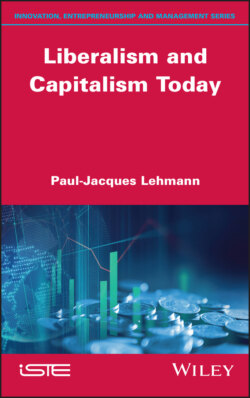Читать книгу Liberalism and Capitalism Today - Paul-Jacques Lehmann - Страница 17
1.2.3. Property rights and savings
ОглавлениеThe right to hold property involves the right to dispose of one’s own property, to sell it, to give it away and to pass it on through inheritance, so that “property breeds property”. In particular, the right to property means that savings can exist. Indeed, it is an essential element for thinking about the future: people became provident as soon as they knew that they risked losing things they cared about, and they knew that, with the right of ownership, they would be able to bequeath to their offspring what they had saved. However, no one agrees to work if they are not sure that them or their descendants will benefit from the fruits of their activity, that is, from the savings they manage to build up. An individual therefore tends to do everything to increase their wealth and put aside what they do not consume. As soon as individuals felt fully responsible for their fate and were convinced that only their efforts were likely to make them progress in the social hierarchy, not only did they enrich themselves, but they also became actors in the progress of their country.
We will see that Weber explains that this willingness to save and the foresight it generates through property rights have combined with the precepts of Protestantism and constitute the essential causes of the development of capitalism through the investment to which these two attitudes lead. Wealth can then increase and, as a direct consequence, more and more rich people appear. On the contrary, the absence of savings – a consequence of the absence of property – is an insurmountable obstacle to becoming rich: not only do people not see the usefulness of working, but even if they did work, they would immediately spend all their income.
This is why de Tocqueville, ahead of his time, encouraged the division of industrial property, by setting up what is known today as employee participation, which consists of giving workers shares in their companies in order to interest each of them in the activity of their manufacture and to make them responsible. “This would produce for the industrial classes effects similar to those brought about by the division of land ownership among the agricultural class […] The worker of our days, like the farmer of the Middle Ages, having no property of his own, seeing no means of assuring by himself the tranquility of his future and gradually rising to wealth, becomes indifferent to anything that is not present enjoyment. Moreover, the savings that the wage earner could thus constitute would enable him to face the difficulties (think of unemployment) caused by industrial crises. In this way, the condition of workers would improve thanks to the ownership of movable property and progression in the social hierarchy would be facilitated”. However, de Tocqueville (2010) did not fail to warn against the risks of movable property, which “almost always depends, more or less, on the passions of another. Whoever owns it must always bend either to the rules of an association or to the desires of man. He is subject to the slightest vicissitudes of his country’s commercial and industrial fortune, his existence is constantly disturbed by the alternatives of well-being and distress, and it is rare that the agitation that reigns in his destiny does not introduce disorder into his ideas and instability into his tastes”.
The philosopher took advantage of this to criticize the socialists who “directly or indirectly attack individual property”. However, to attack property is not to protect the individual; it is to attack their freedom, their responsibility, and therefore their morality. No doubt this is the reason why he warned owners about the durability of this right: “They should not be under any illusions about the strength of their situation, nor should they imagine that the right of ownership is an impassable rampart, because nowhere up to now has it been crossed. For our time is like no other”. His argument was based on the fact that this right was originally the basis of many other rights, giving rise to no criticism: “it formed then like the surrounding wall of the society of which all the other rights were the defenses put forward. The blows did not reach it. They didn’t even try to reach it”. On the contrary, it was then considered “the rest of a destroyed aristocratic world, an isolated privilege in the middle of a leveled society, behind many other more questionable and hated rights. It is now alone in sustaining the direct and incessant clash of democratic opinions every day”. Thus, it is not enough to say that property is inviolable; it must, at the same time, be protected from the temptations of power and the usurpation of those who wish to appropriate it.
As in many fields, de Tocqueville had a premonitory vision of the evolution of society: “There is little doubt that one day, it is between those who own and those who do not that the political struggle will be established, that the great battlefield will be ownership and that the great political questions will relate to more or less profound changes in the rights of owners”.
